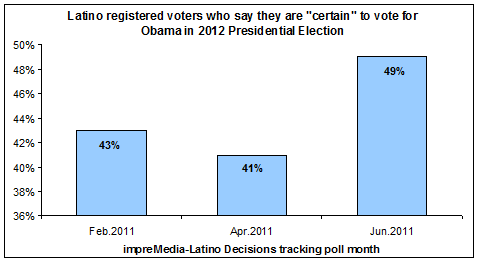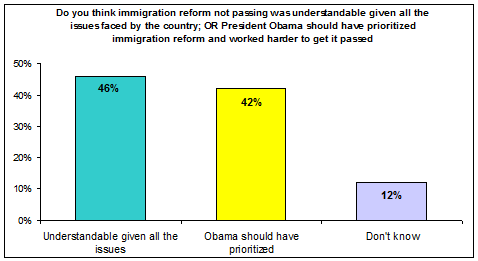By Pilar Marrero – [email protected] | 2011-06-13
New Poll Results Posted Here
LOS ANGELES, CA.- The number of Latino voters who intend to support President Barack Obama increased by 9% compared with those supporting the president in the previous impreMedia/Latino Decisions (LD) poll, conducted two months ago. However, the same group is profoundly divided in their opinions about the Obama administration’s actions on immigration policy.
This increase in voting intentions favoring Obama among registered Latino voters should not be discounted as something isolated, since during the last two polls, 43% and 41% of respondents respectively said they would vote for him. During the most recent poll conducted in late May, 49% said they are sure they will vote to re-elect the president, while another 12% said they might vote for him.

Analysts think this increase is consistent with the support the president has obtained from the population as a whole, because of the capture and death of terrorist leader Osama bin Laden.
However, in the case of Latino voters, this increase could have an added dimension: The Obama administration, knowing how dissatisfied Latinos are about the immigration issue, has been discussing the need for comprehensive reform. This started with a speech the president gave in May in Texas and continued with declarations made by several top administration officials. Just two weeks ago, Obama sent his secretary of labor, Hilda Solís—a popular former Los Angeles lawmaker—to East Los Angeles to talk about immigration.
“In some way, we could say Latino voters are partly responding to what seems to be a renewed interest from the Obama administration in bringing up immigration reform, which has strong support in the community,” said Matt Barreto, a political science professor at the University of Washington and pollster for LD.
Nevertheless, some poll numbers reveal Latinos do not completely support the president’s position on immigration and the reform issue. In fact, the divisions run deep: 48% said Obama is handling the issue well, while another 48% said he is not.
Although 46% said it is understandable, given everything Obama has to address, that he did not fulfill his promise to pass immigration reform during his first year in office, another 42% are not so understanding; they think he should have included the issue in his list of priorities anyway.

“Latino voters have responded positively to the mobilization to reactivate the immigration issue and are showing more support for Obama, but the other results show that next year, they will be looking for something more than speeches at the border,” added Barreto. “The president needs to push this reform proposal and strongly pressure Congress.”
Asked whether Obama is being sincere when he says his intention is to push for immigration reform, 51% of Latino voters agreed. But a significant number, 41%, think he is only saying what Latinos want to hear.
Likewise, Latinos are placing a good part of the blame on the shoulders of the GOP. Another poll question shows that 50% think the reform has not been approved because Republicans blocked it, while 33% think Obama did not push for reform strongly enough.
“It’s clear that Latino voters are holding the [Democratic] party responsible for not making too much of an effort on immigration, but also the Republicans for preventing it,” said Gabriel Sánchez, a political science professor at the University of New Mexico.
Among respondents, 55% think Republicans are constantly talking about securing the border as an excuse not to approve immigration reform. Only 30% think border security is a legitimate concern. And 62% think the country is focusing enough resources on raids and deportations, and they oppose increasing those resources.
Frank Sharry, president of America’s Voice, a pro-immigration reform group in Washington, D.C., said the poll’s results forecast political consequences for both parties.
“Republicans will have to do more than change their tone to connect with these voters, and Democrats will have to fulfill the promises they made, or they will have a harder time mobilizing the vote in 2012,” said Sharry.
METHODOLOGY:
LD polled 500 Latino registered voters between May 24 and June 4 in the 21 states with the largest Hispanic populations, representing 95% of the electorate. Those interviewed were selected at random from voter lists. The poll includes interviews conducted via cell phone and land line telephones. The margin of error is /-4.3%. The interviews were conducted in English or Spanish at the request of the respondent. Full results are posted here.

